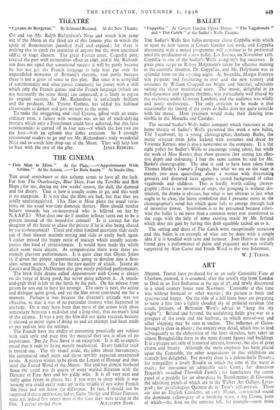THE CINEMA
" This Man is Mine." At the Plaza.—" Appointment With Crime." At the Astoria. —" Le Bois Sacre." At Studio One.
THE usual contributor to this column seems to have all the luck. For him The Overlanders, Blue Skies, Ivan the Terrible and Bob Hope ; for me, during my few weeks' tenure, the dull, the damned and the dreary. That is how it usually seems to go, and this week is no exception. It is not that the films are bad, but that they are totally undistinguished. This Man is Mine plays the usual varia- tions on the usual war-time domestic themes. How should mother behave towards her ex-housemaid who is billeted on her by N.A.A.F.I.? What does one do if another billetee turns out to be a private instead of the hoped-for colonel? Is it correct for the daughter of the house to chase the private if he is also being chased by the ex-housemaid? These and other kindred questions slide easily out of their theatre matinee setting and slide as easily back again. I rather missed the happy rattle of teacups which usually accom- panies this kind of entertainment. It would have made the whole attair seem more decent. As compensation there were three ex- tremely pleasant performances. It is quite clear that Glynis Johns is, if given the proper opportunities, going to develop into a first- class screen actress. She has the rare quality of attack. Jeanne de Casalis and Hugh McDermott also give nicely polished performances.
The brisk little drama called Appointment with Crime is always on the verge of being good, but never quite achieves it. A smash- and-grab thief is left in the lurch by his pals. On his release from prison he sets out to have his revenge. The story is neat, the acting and dialogue quite good, and yet the film never convinced me for a moment. Perhaps it was because the director's attitude was too objective, so that it was of no particular interest what happened to anybody. Or it may have been that most of the action took place somewhere between a mid-shot and a long-shot, that no-man's land of the cinema. It was a pity the film did not quite succeed, because it showed so many signs cf doing so and an attempt had been made to put realism into the settings. The French have the ability of presenting practically any subject with such style and pace that the material they use is often of no importance. But Le Bois Sacre is an exception. It is all so experi- enced that it ends by being merely mechanical. Every familiar trick is trotted out. The sly visual aside, the jokes about bureaucracy, the caricatured small parts and those terribly expected unexpected twists. A poetess wishes to be given the Legion of Honour and thus enter the Sacred Wood of the Muses. She and her dentist husband dance the usual pas de qua're of extra marital flirtation with the Director of Fine Arts and his giddy wife. It is all very neat and really quite funny in places, but if you went to sleep while it was :unning you could easily wake up in the middle of any other French ilm farce and not know the difference. In fact, I should not be iurprised if these enchanting ladles, Gaby Morlay and Elvire Popesco, were not indeed fast asleep most of the time they were acting in the


































 Previous page
Previous page